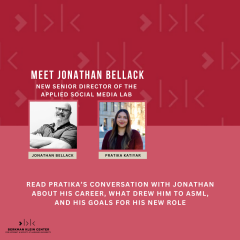
Meet Jonathan Bellack, New Senior Director of the Applied Social Media Lab
Organized online harassment. Repressive censorship. State-sponsored disinformation. These are just some of the digital harms that Jonathan Bellack worked to counter as a product management leader at Google.
Bellack now joins the Applied Social Media Lab (ASML) at Harvard’s Berkman Klein Center for Internet & Society after an extensive career that began at dot-com era startups. When Jonathan left Google in early 2023, he took time off to envision next steps, and decided he wanted to apply his skills and experiences to help develop technologies that foster healthier online spaces.
I sat down with Jonathan on the fifth floor of the Lewis International Law Center to chat about his career, what drew him to ASML, and his goals for his new role.
Pratika Katiyar: What inspired you to join the Applied Social Media Lab after working in the private sector, specifically at a Big Tech company, for so long?
Jonathan Bellack: My career, even in Big Tech, shifted towards wanting to be helpful and trying to help make the Internet a little bit less terrible. I had both the opportunity to do scaled work that affected lots of people all over the world with Google’s Counter-Abuse Technology team, but also experimental work with a little unit called Jigsaw. When I saw that the Berkman Klein Center was going to build the Applied Social Media Lab to assemble a group of practitioners to invent technology to help make the internet a healthier and safer place, I couldn't resist.
PK: You're joining as ASML’s director, what is one goal that you have for your work?
JB: I’d really like to bring together a lot of amazing people. There are a lot of professionals in industry, academia, and public service who care deeply about both the good that the internet has done for the world, and the challenges that we're currently facing as we deal with the next generation of technology and come to terms with some of the ways it's changed culture. I'm really excited to bring them together, in both convenings and as members of the full time team at the Applied Social Media Lab, so that we can learn from each other and invent together.
PK: What's something people should know about you that isn't in your resume?
JB: I am an enormous, all-purpose nerd. So if you want to talk about Marvel Comics, the Marvel movies, the Dune movie and how it compares to the book, Dungeons and Dragons, video games, and so forth, I'm here for you.
PK: How can an initiative like ASML meaningfully contribute to the discourse when there's already so many stakeholders, like government officials, activists, technologists, and legal scholars, in tech policy?
JB: I think there's an opportunity to think further ahead, in a positive way, on behalf of all of those stakeholders. I know this from my own experience in industry, it's very hard sometimes to look past what you're dealing with right now. Everybody's dealing with a lot. I'm hoping that we can start to say, well, what will social media be in a decade, in 20 years? What are new ways to approach these problems that will maybe make them feel less like problems, and again, capture what makes these platforms great, that maybe haven't been thought of before? And then actually build a little bit of technology to give people a feel for what that might be like if it was real.
PK: Why were you interested in working in product management after college?
JB: That’s a great question. I was incredibly lucky. We got our first computer at home when I was in fifth grade and I was just obsessed with it. I was writing programs in the BASIC language and playing prehistoric computer games. Then, when I got to college, it was just when dorms were starting to be wired with access to the internet, and I discovered early online communities like Usenet, and there were these precursors of modern online role playing games called MUDs and MUSHes. And so I met people from around the world, and was just kind of fascinated and in love with these possibilities. The first commercial Internet browser was invented as I was graduating from college, and suddenly everything I had been excited and passionate about outside of my academic life became an industry. I jumped in and never looked back.
PK: What's your favorite social media platform right now?
JB: Oh my goodness. I don't have one because I use too many. I would say things that are interesting to me right now are actually what it means when older platforms come back in new ways. For example, LinkedIn is becoming more widely discussed after years as this product people sort of joked about. With all of the layoffs in technology, it's sort of having a moment again. Or Reddit. Its reputation for toxicity was drifting toward 4chan territory, but they invested a lot in healthier communities, and now a lot of people turn to Reddit for trustworthy information and community.
PK: What's an issue that keeps you up at night?
JB: Not much, because at the end of the day, my wife and I have got two school-aged sons. We've got a nine month old Labradoodle at home. We've got two cats. We both volunteer in our community. Someone’s got to cook dinner. By the time we get through all of that, very little will keep me up because I'm exhausted.
Pratika Katiyar is a research assistant with the Initiative for a Representative First Amendment and the Berkman Klein Center. She is a leading free expression activist and one of HerCampus x e.l.f. cosmetics 22 Under 22 most inspiring women.
